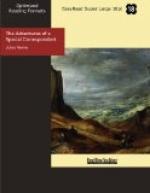Here, for the first time, the Caternas saw pass along between the inhabitants, who stood at attention more from fear than respect, a mandarin on horseback, preceded by a servant carrying a fringed parasol, the mark of his master’s dignity.
But there is one curiosity for which Sou-Tcheou is worth a visit. It is there that the Great Wall of China ends.
After descending to the southeast toward Lan-Tcheou, the wall runs to the northeast, covering the provinces of Kian-Sou, Chan-si, and Petchili to the north of Pekin. Here it is little more than an embankment with a tower here and there, mostly in ruins. I should have failed in my duty as a chronicler if I had not noticed this gigantic work at its beginning, for it far surpasses the works of our modern fortifications.
“Is it of any real use, this wall of China?” asked Major Noltitz.
“To the Chinese, I do not know,” said I; “but certainly it is to our political orators for purposes of comparison, when discussing treaties of commerce. Without it, what would become of the eloquence of our legislators?”
CHAPTER XXIII.
I have not seen Kinko for two days, and the last was only to exchange a few words with him to relieve his anxiety.
To-night I will try and visit him. I have taken care to lay in a few provisions at Sou-Tcheou.
We started at three o’clock. We have got a more powerful engine on. Across this undulating country the gradients are occasionally rather steep. Seven hundred kilometres separate us from the important city of Lan-Tcheou, where we ought to arrive to-morrow morning, running thirty miles an hour.
I remarked to Pan-Chao that this average was not a high one.
“What would you have?” he replied, crunching the watermelon seeds. “You will not change, and nothing will change the temperament of the Celestials. As they are conservatives in all things, so will they be conservative in this matter of speed, no matter how the engine may be improved. And, besides, Monsieur Bombarnac, that there are railways at all in the Middle Kingdom is a wonder to me.”
“I agree with you, but where you have a railway you might as well get all the advantage out of it that you can.”
“Bah!” said Pan-Chao carelessly.
“Speed,” said I, “is a gain of time—and to gain time—”
“Time does not exist in China, Monsieur Bombarnac, and it cannot exist for a population of four hundred millions. There would not be enough for everybody. And so we do not count by days and hours, but always by moons and watches.”
“Which is more poetical than practical,” I remark.
“Practical, Mr. Reporter? You Westerners are never without that word in your mouth. To be practical is to be the slave of time, work, money, business, the world, everybody else, and one’s self included. I confess that during my stay in Europe—you can ask Doctor Tio-King—I have not been very practical, and now I return to Asia I shall be less so. I shall let myself live, that is all, as the cloud floats in the breeze, the straw on the stream, as the thought is borne away by the imagination.”




